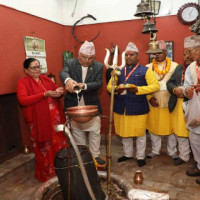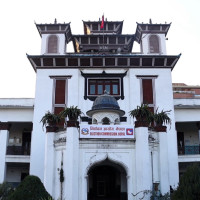- Monday, 16 February 2026
Annual organic certification a burden for tea farmers
By Kokila Dhakal,Ilam, Nov. 27: The annual fees required for organic certification—already an expensive and compulsory process—have increasingly become a major burden for Nepali orthodox tea producers.
The organic certification process, mandatory for Nepali tea to be exported to third countries, is already complicated and cumbersome. Since Nepal does not have its own organic certification system, tea farmers and industries have been forced to pay large sums of money every year to foreign agencies, tea producers say.
Until now, Nepali tea has been certified organic by international organisations such as NASA, SRES and IOM.
“Our tea is exported mainly to third countries, and certification is absolutely mandatory for that. If we fail to present renewed certificates, foreign buyers raise questions,” said Tanka Dahal, proprietor of Greenhill Tea Industries in Sakhèjung, Ilam. Organic certification costs Rs. 700,000 to 800,000 annually. Organic certificates must also be renewed every year.
According to Dahal, for the renewal process, farmers must reapply, after which inspectors from the respective agencies visit tea farms to monitor what is being used on the tea plants. The certificates are renewed only after the inspectors submit reports based on their on-site assessments.
Sharad Subba, a Jasbire-based tea producer in Ilam who has been producing organic tea for many years, said that organic certification and renewal have become a significant financial burden for both farmers and tea entrepreneurs.
Subba, recognised as ‘one of Nepal’s best tea makers’, says that even though many plantations were certified in the past, the requirement for continuous renewal has created difficulties, especially for small farmers.
As foreign consumers increasingly prefer organic tea, small farmers, cooperatives and industries have been attempting to produce fully organic tea on their own. However, farmers say that sustaining this practice for the minimum required period of three to four years becomes financially challenging. After submitting an application for certification, farmers must themselves bear the cost of continuous monitoring by the certifying agency for three years.
Nevertheless, for better prices and export opportunities, there is no alternative to organic certification, said Rabin Rai, General Secretary of the Central Tea Cooperative Federation.
Uttam Kumar Shrestha, former president of the Suryodaya Orthodox Tea Producers Association - the umbrella orgaisation of orthodox tea industries across Nepal, also said that although organic production holds the future of Nepali tea, the absence of an organic certification system within Nepal has created problems.
“The government spends billions in various sectors, including agriculture, but has done nothing for tea,” Shrestha said. “Even if there is no specific programme for small tea farmers, it would have been immensely helpful if the government had established at least one organic certification laboratory within the country.”
According to him, small farmers have been compelled to spend hundreds of thousands of rupees abroad solely for certification. So far, several tea factories and estates—including Shangri-La Tea Factory in Sakhèjung, Gorkha Tea Estate in Sundarpani, Kanchenjungha Tea Estate in Panchthar, Sandakpur Tea Factory in Maipokhari, Jasbire Tea Factory, and the Brothers Tea Industry in Deumai—have obtained organic certification from NASA, IOM and SRES.
Likewise, the High-Hill Tea Producers Cooperative in Sakhèjung, Sundarpani Tea Producers Cooperative under Gorkha Tea Estate, Eco Cooperative in Kolbung, and Himshikhar Tea Producers Cooperative under Panchakanya have received organic certification from NASA.
According to the Central Tea Cooperative Federation, Greenhill in Sakhèjung, Tinjure Cooperative in Chamaita, Ilameli Tea Cooperative in Fikkal, and Ajambare, Deurali and Nawami Tea Producers Cooperatives in Jitpur have been certified organic by the European organic agencies SRES and IOM. Industries and cooperatives also said that farmers producing organic tea receive higher prices for green leaves throughout the year.
The price of organic green leaves is up to Rs. 1,600 per kg, depending on quality. From these leaves, various types of teas—such as green tea, golden tea, white tea, oolong tea, golden pearl and golden ring—are produced, which international consumers highly appreciate, said master tea maker Sharad Subba.




-square-thumb.jpg)




-original-thumb.jpg)





